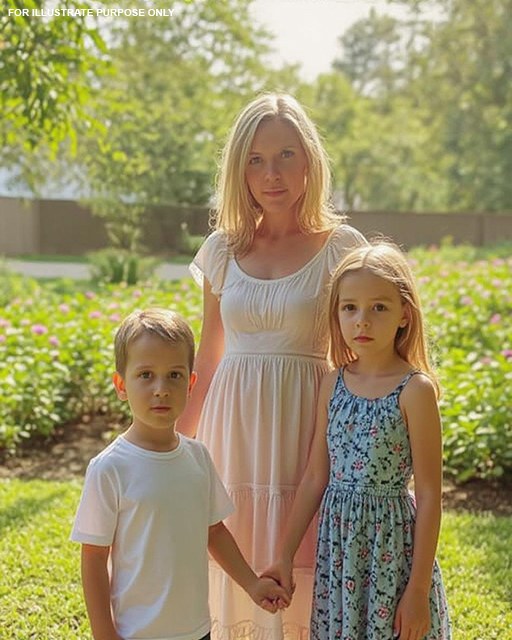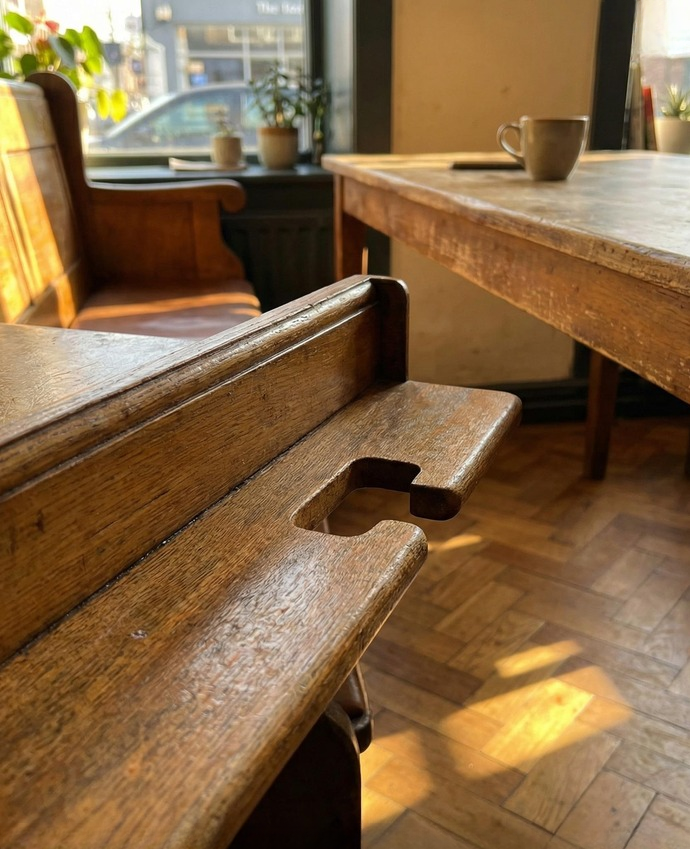
Rain fell in heavy sheets, battering the aging roof of the tiny house at the end of Oakridge Lane. Inside, 34-year-old single mother Maria Thompson stood in the dim light of the kitchen, holding a pot under a steady leak that had broken through the ceiling—again.
Her two children, Ava (7) and Jacob (4), huddled on the couch with a blanket wrapped around their shoulders. The sound of thunder made Jacob whimper and cover his ears.
It had been this way for weeks. Ever since the last major storm, the roof had begun to rot and buckle. The leaks had multiplied. Pails, pots, and bowls decorated the floors like odd furniture. The constant dripping was like a cruel ticking clock—a reminder of everything Maria couldn’t fix.
Maria had no family to call. Her husband, a construction worker, had died three years earlier in a worksite accident, leaving her to raise the kids alone. Since then, every dollar she earned at the diner went to groceries, rent, and the bare minimum for daycare. Repairs, she told herself repeatedly, were a luxury she couldn’t afford.
The house had been all she could afford after her husband’s passing. “It had good bones,” the landlord had said, but the bones were clearly crumbling now. And with her landlord out of state and ignoring her calls, Maria was left to carry the burden alone.
That night, as the wind howled and water poured into her home, she broke down.
She slumped against the wall and wept quietly, trying not to let her kids hear. But Ava did. The little girl padded over in her unicorn slippers, placed a hand on her mother’s shoulder, and whispered, “Don’t cry, Mama. I asked God to help us. Maybe He’s listening.”
Maria didn’t have the heart to say what she was thinking: God is busy. But she nodded and held her daughter close.
What Maria didn’t know was that someone had been listening—or at least watching.
Next door, through the slatted blinds, elderly couple Ed and Lorraine McKinley had seen the blue tarps and buckets. They had seen Maria rushing the kids into the car under umbrellas. And Ed, a retired contractor with arthritis in his hands but still a heart full of purpose, had finally had enough.
The next morning, Ed showed up on Maria’s porch with his toolbelt slung around his waist like an old badge of honor.
“Morning,” he said, tipping his cap. “Hope you don’t mind, but I noticed you’ve been having some trouble with the roof.”
Maria opened the door cautiously. She looked tired, her hair tied up, dark circles under her eyes. “Yeah. It’s… it’s pretty bad.”
Ed nodded. “Mind if I take a look?”
She hesitated. “I can’t really afford anything right now…”
Ed waved a hand. “Didn’t ask for payment. Just wanna see.”
From there, a spark turned into a blaze.
Ed climbed the roof that day—slow but steady. He brought photos down. “Rotten shingles, busted flashing, and a whole lotta water damage,” he explained.
That night, the McKinleys made some calls. They told the neighbors on Oakridge what was going on—and something remarkable happened.
By the end of the week, the entire neighborhood had rallied.
Ava squealed when she saw trucks and ladders pulling up in front of the house. Volunteers brought wood, nails, and tools. A younger couple from three doors down, Marcus and Leila, brought hot meals every evening. Mrs. Jensen, the schoolteacher, offered to watch the kids during the repairs.
One neighbor, Jamal, worked in roofing. Another, DeShawn, had scaffolding from his painting business.
“We’ve got this,” Jamal told Maria. “You’ve been through enough.”
Maria stood on the porch with a hand over her mouth, tears slipping silently down her face.
“Why would you all do this for me?”
“Why would you all do this for me?” Maria asked, her voice barely above a whisper.
Ed smiled gently, his weathered hands resting on his toolbelt. “Because sometimes,” he said, “the village needs to show up before someone falls through the cracks.”
That week felt like a dream. The sound of hammering replaced the dripping. The buzz of power tools replaced the silence that had once wrapped the house like a heavy fog. People Maria had only waved to in passing were suddenly bringing insulation, replacing beams, painting trim, fixing pipes. No one asked for anything in return.
Ava danced around the yard with her rain boots on, twirling in the puddles that no longer made it inside the house. Jacob, normally shy, had taken to sitting beside Ed as he worked, handing him nails like a tiny apprentice.
By Friday, the roof was new. Sturdy. Leak-proof. Beautiful. But that wasn’t the biggest change.
It was the way Maria stood a little straighter. The way she laughed now and didn’t catch herself out of guilt. The way Ava whispered at bedtime, “Mama, I think God heard me. He just used the neighbors.”
Three weeks later, Maria was offered a promotion at the diner. One of the customers—turns out, a woman from the mayor’s office—had seen the repairs happening and asked Maria about it. Touched by her story and determination, she helped fast-track Maria into a management role. The raise wasn’t huge, but it meant Maria could finally start saving—really saving—for her children’s future.
And that Christmas, there was something under the tree for Ava and Jacob. Books, socks, small toys… nothing fancy. But everything wrapped with care. And for the first time in three years, Maria didn’t feel ashamed.
She felt held.
One Month Later
At the annual Oakridge Lane block party, Maria brought a tray of cupcakes she had baked with Ava. Neighbors buzzed around, music played, and lights strung through the trees flickered in the twilight.
Standing beside Ed, she looked around at the community that had once been just a row of strangers.
“Think you’ll be okay now?” Ed asked softly.
Maria smiled, tears glinting in her eyes.
“I think I already am.”




1 thought on “Landlord Ignored My Leaking Roof – So My Neighbors Stepped In and Gave Him the S.h0ck of His Life”